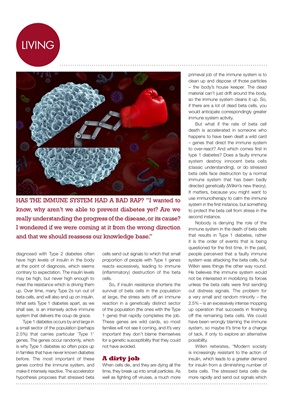
LIVINGLIVING
diagnosed with Type 2 diabetes often
have high levels of insulin in the body
at the point of diagnosis, which seems
contrary to expectation. The insulin levels
may be high, but never high enough to
meet the resistance which is driving them
up. Over time, many Type 2s run out of
beta cells, and will also end up on insulin.
What sets Type 1 diabetes apart, as we
shall see, is an intensely active immune
system that delivers the coup de grace.
Type 1 diabetes occurs by and large in
a small sector of the population (perhaps
2.5%) that carries particular 'Type 1'
genes. The genes occur randomly, which
is why Type 1 diabetes so often pops up
in families that have never known diabetes
before. The most important of these
genes control the immune system, and
make it intensely reactive. The accelerator
hypothesis proposes that stressed beta
cells send out signals to which that small
proportion of people with Type 1 genes
reacts excessively, leading to immune
(inflammatory) destruction of the beta
cells.
So, if insulin resistance shortens the
survival of beta cells in the population
at large, the stress sets off an immune
reaction in a genetically distinct sector
of the population (the ones with the Type
1 gene) that rapidly completes the job.
These genes are wild cards, so most
families will not see it coming, and it's very
important they don't blame themselves
for a genetic susceptibility that they could
not have avoided.
A dirty job
When cells die, and they are dying all the
time, they break up into small particles. As
well as fighting off viruses, a much more
THE IMMUNE SYSTEM FIGHTS BACK. "I wanted to know,
why aren't we able to prevent diabetes yet? Are we really
understanding the progress of the disease, or its cause? I
wondered if we were coming at it from the wrong direction
and that we should reassess our knowledge base."
primeval job of the immune system is to
clean up and dispose of those particles
- the body's house keeper. The dead
material can't just drift around the body,
so the immune system cleans it up. So,
if there are a lot of dead beta cells, you
would anticipate correspondingly greater
immune system activity.
But what if the rate of beta cell
death is accelerated in someone who
happens to have been dealt a wild card
- genes that direct the immune system
to over-react? And which comes first in
type 1 diabetes? Does a faulty immune
system destroy innocent beta cells
(classic understanding), or do stressed
beta cells face destruction by a normal
immune system that has been badly
directed genetically (Wilkin's new theory).
It matters, because you might want to
use immunotherapy to calm the immune
system in the first instance, but something
to protect the beta cell from stress in the
second instance.
Nobody is denying the role of the
immune system in the death of beta cells
that results in Type 1 diabetes, rather
it is the order of events that is being
questioned for the first time. In the past,
people perceived that a faulty immune
system was attacking the beta cells, but
Wilkin sees things the other way round.
He believes the immune system would
not be interested in mobilizing its forces
unless the beta cells were first sending
out distress signals. The problem for
a very small and random minority - the
2.5% - is an excessively intense mopping
up operation that succeeds in finishing
off the remaining beta cells. We could
have been wrongly blaming the immune
system, so maybe it's time for a change
of tack, if only to explore an alternative
possibility.
Wilkin reiterates, "Modern society
is increasingly resistant to the action of
insulin, which leads to a greater demand
for insulin from a diminishing number of
beta cells. The stressed beta cells die
more rapidly and send out signals which